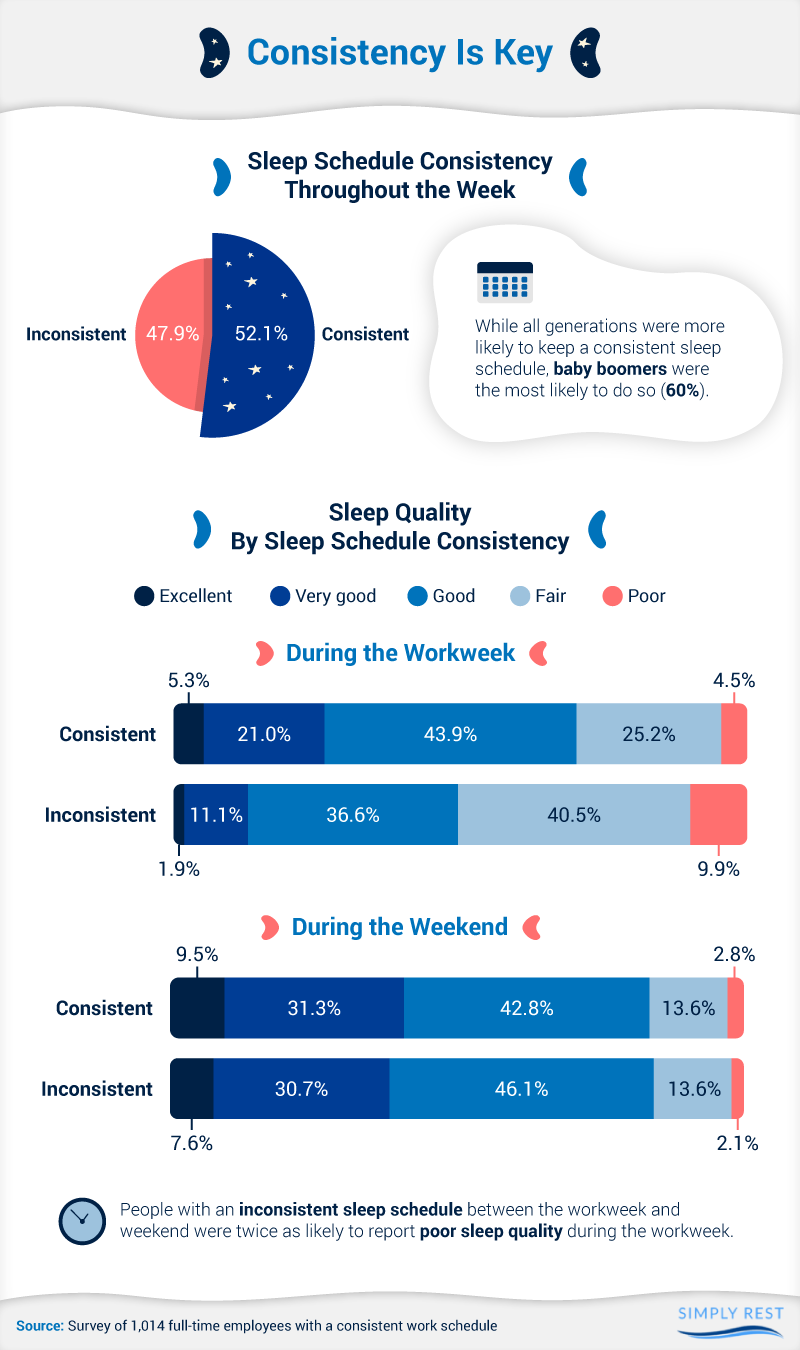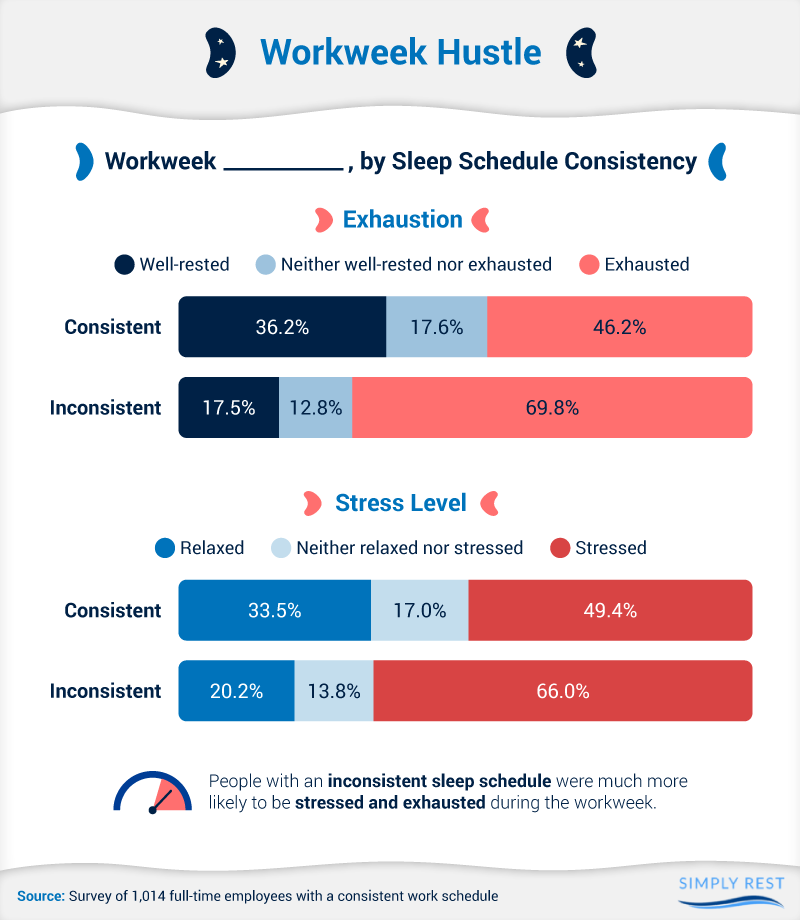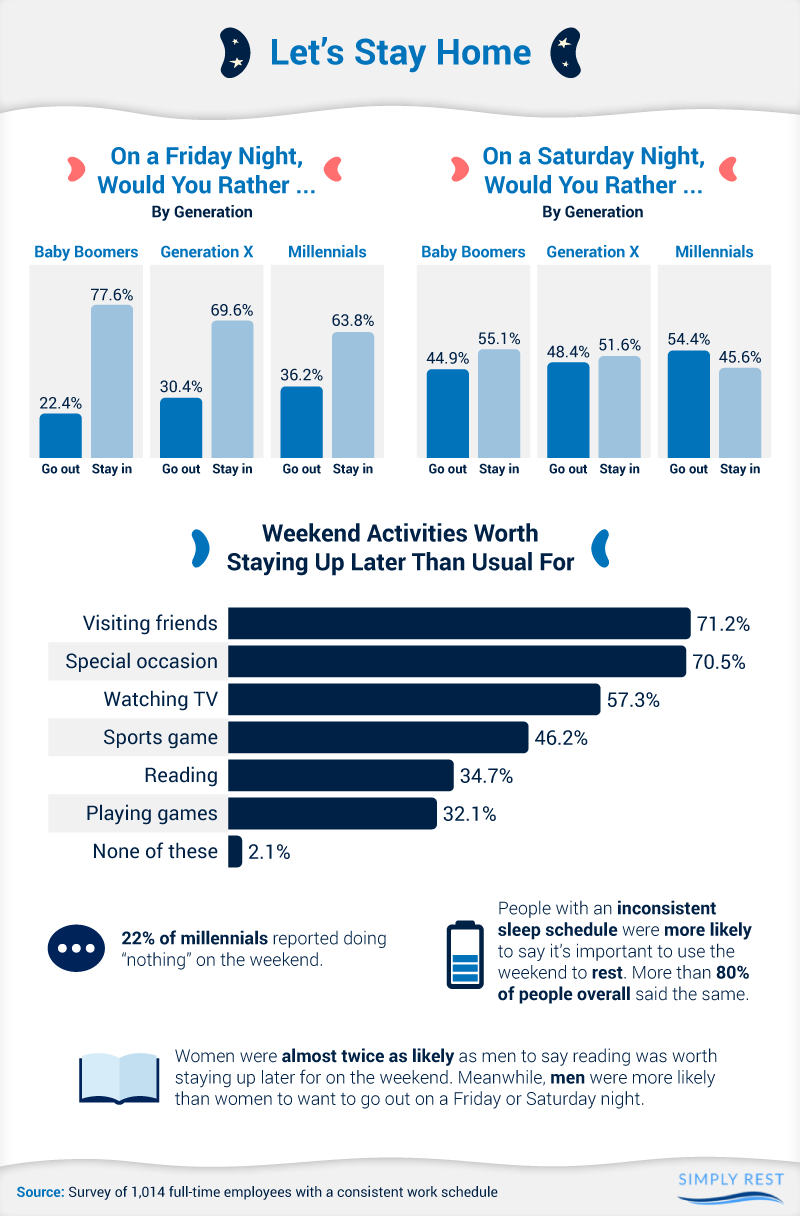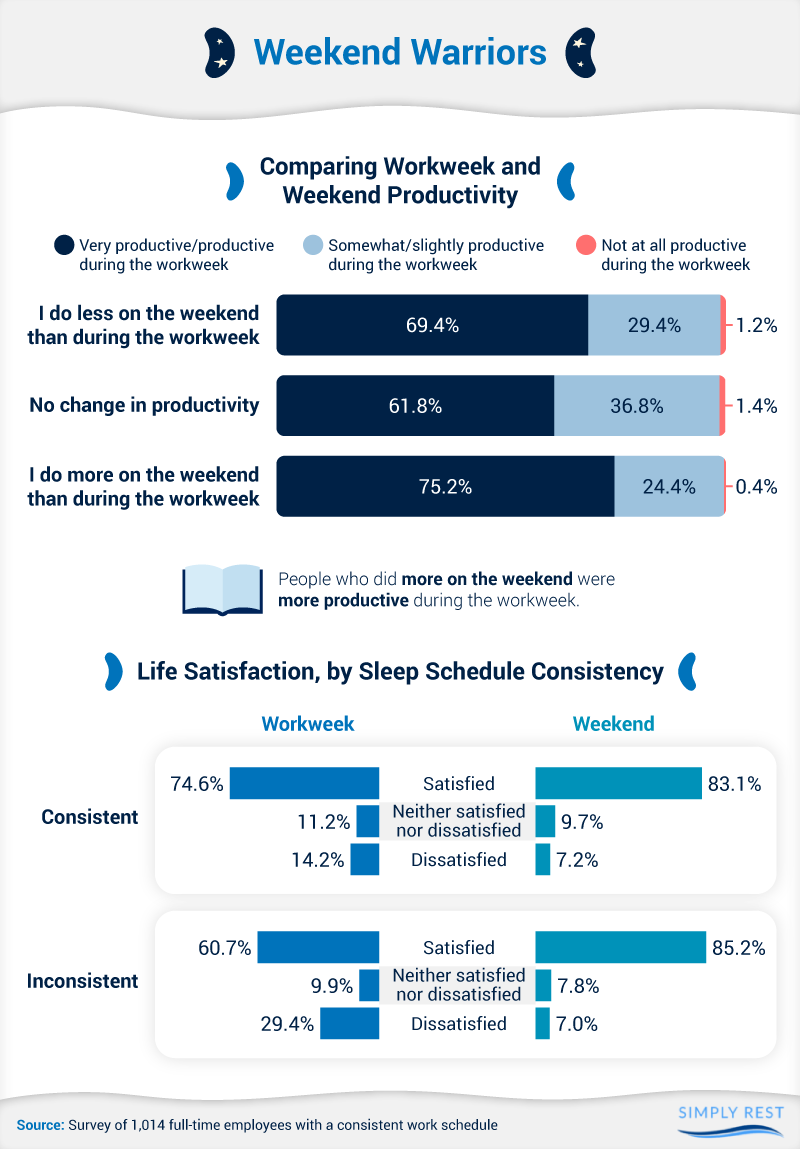What if we told you that making a small change in your sleep schedule could optimize your workweek and the way you feel in and out of the office? After talking to more than 1,000 employed Americans with different approaches to sleep, we firmly believe this is possible.
Respondents’ sleep schedules throughout the week – whether varied or consistent – influenced their stress, exhaustion, and even life satisfaction. Continue reading to see what else the data revealed, as well as what it might suggest for your own approach to sleep.
Variety Is Not the Spice of Sleep
Our data revealed sleep scheduling was a skill learned with age, as baby boomers were the most likely to stick to a schedule and reap the benefits. For 47.9 percent of the population at large, however, sleep schedules were inconsistent.

We found that quality sleep followed a quality schedule, so take note. Those who kept a consistent sleep schedule were more likely describe their sleep quality as “excellent,” “very good,” and “good,” as opposed to respondents who let their sleep schedule vary and were more likely to call their sleep quality “poor” and “fair.”
Above all, consistency was the key to success. It’s fine to keep a sleep schedule that works best for you, so long as you stick to it. Just remember that the weekend matters, too.Those who stuck to their normal sleep routine on the weekend also rated their sleep as higher quality.
Controlling Your Workweek

For many respondents, controlling their sleep habits also helped them gain more control over their workweek. Those who established a consistent sleep schedule went to work well-rested more than a third of the time. This dropped by 18.7 percentage points if the respondent had a varied sleep schedule.
Exhaustion was also extremely common among employees who varied their sleep during the workweek. Even with the greatest job or position, exhaustion and sleep deprivation can make the easiest of tasks feel demanding. Workplace fatigue eventually can seep into other aspects of your life, making it harder to focus and feel motivated or connected.
Stress levels told a similar story, with those who maintained a consistent sleep schedule being 13.3 percentage points more likely to feel relaxed throughout the workweek. On the other hand, 66 percent of those who let their sleep schedule vary said they felt stressed at work. Only 20.2 percent of this group felt relaxed.
The Ideal Weekend
If you’re like most participants in our study, your ideal Friday night would likely be spent staying in, while Saturday could be a better night to meet friends if the mood strikes. Even millennials were more likely to want to stay in on a Friday night than have dinner outside. Baby boomers and Gen Xers, however, were more likely than millennials to feel this way about Saturday.

Staying up late on either night was worth it for a few weekend activities, though. Visiting friends (71.2 percent) and special occasions (70.5 percent) commonly kept people up later than normal, but even activities like reading made sacrificing sleep worthwhile for more than a third of respondents.
This group of late-night readers, however, was more likely to be composed of women, while men showed a higher propensity to lose sleep for the sake of going out. And although millennials were the most likely to hit the town on Friday and Saturday night, they were also the most likely to report “doing nothing” on the weekend.
Working on the Weekend
Weekend work and workday work could mean two very different things, but the more productive respondents were on the weekend, the more productive they were during the workweek. Having a productive weekend was very beneficial for the typical employee. When you’re considering your sleep schedule, you might want to think about adding some productive activities to your weekend.

A consistent workweek sleep schedule was so important that it showed a distinct correlation to overall life satisfaction. Three-quarters of people with a consistent workweek sleep schedule were satisfied with their life –this percentage dropped by nearly 14 points if the respondent let his or her sleep schedule vary throughout the workweek. When it came to the weekend, however, life satisfaction actually increased the more a person let their sleep schedule change.
Scheduling Perfect Sleep
Our data revealed that it really doesn’t take much to gain a little more control over your life. Your stress level, exhaustion, and life satisfaction can improve if you maintain and stick to a sleep schedule compatible with your lifestyle. Consistency was a more critical component than the actual schedule, and weekend activities certainly don’t need to be sacrificed (even though most respondents admitted they just wanted to stay in).
In the words of our resident sleep expert Matthew Nolan, “There isn’t one perfect time or one perfect schedule for everyone. Instead, we can tailor our sleep schedules to our lives and achieve the success, calm, and even health we’re seeking. Just take the time to sit down with pen and paper to craft a sleep schedule that works for you, and then stick to it. And let us know how it goes!”
If you can create a schedule, we can take it from there and help you get the perfect mattress for your new routine. Simply Rest provides the expert advice, reviews, and quality products you need for restful sleep. Whether you’re looking for the best mattress, a memory foam mattress or different types of a mattress in a box, we have resources and guides from our team of experienced sleep specialists.
Methodology and Limitations
To gather the data shown in the above study, a survey was conducted using Amazon’s Mechanical Turk service. A total of 1,014 people were surveyed, including 517 women, 494 men, and three people who noted neither. 107 of the participants were baby boomers (9 percent margin of error); 312 were from Generation X (6 percent margin of error); 577 were millennials (4 percent margin of error); and 18 belonged to a generation outside of those.
To qualify for this study, respondents had to have a consistent work schedule and be employed full time. All data shown relies on self-reporting, which can come with issues such as telescoping and exaggeration. To combat these, an attention-check question was used in the survey.
Fair Use Statement
Time to schedule your sleep! Share this knowledge with others who may not know just how important a consistent sleep schedule really is, but be sure your use is noncommercial, and you link back to this page.
This article is for informational purposes and should not replace advice from your doctor or other medical professional.